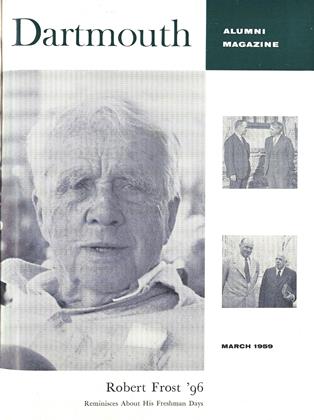AN impression of Richard Hovey, Dartmouth's poet laureate, comes to light in the following letter written by William Jewett Tucker in 1912, three years after he had retired as President of the College. The letter was written in reply to an inquiry from Willard Huntington Wright, at that time literary editor of the LosAngeles Times, asking for Dr. Tucker's recollection of Hovey.
Hanover, N. H. March 21, 1912
MY DEAR MR. WRIGHT:
You ask me for my personal impressions of Richard Hovey. My first meeting with him left an ineffaceable impression. It was in the spring of 1893, soon after my election to the presidency of Dartmouth. I had come to Hanover for a few days of preliminary business, and chanced to find the national convention of the Psi Upsilon Fraternity in session. At a public meeting of the Fraternity Hovey gave his lyric entitled "Comrades." I had at the time known him only as a recent graduate of unique reputation among his intimates, but he had not spoken ten lines before I said to myself —here at last is a poet. To quote his own words on the call of Nature,
"it thrilled My heart as if a hero had just spoken."
I can hear still the deep, jubilant tones of his voice as he uttered the opening refrain
"Again among the hills, The shaggy hills"
"Again among the hills, The jubilant unbroken Long dreaming of the hills"
"Again among the hills, The tranquil hills, That took me as a boy And filled my spirit with the silences."
Recalling this somewhat extended lyric, as it passes from the praise of Nature to the praises of the College
"Praise that thou givest to us understanding To wring from the world's heart New answers to new doubts - to make the landing On shores that have no chart!"
on to the song of Comrades -
"Comrades, pour the wine tonight,"
there is no faltering in power, no false note of sentiment, nothing common or trivial. With Hovey sentiment often deepens into passion, it never becomes foolish or inane. He is in this regard the best interpreter of college sentiment of all who have sung or written under its spell. He has caught the spirit of college life in all its moods. With whatever abandon he may sing he is never unreal, he is never far from the heart of it all. And when he rises into his higher moods there is a compelling force in his song above that which comes from the ordinary appeal to sentiment or loyalty. Not infrequently he strikes the note of majesty. His "Men of Dartmouth" was sung, as was most fit, on occasion of the recent inauguration of President Nichols at Dartmouth. I noticed that, as the delegates and invited guests present began to catch the words, they turned with one accord to the printed slip, seemingly conscious that they were listening to no common college song.
One is tempted to go beyond personal and college associations in writing even a brief word about Richard Hovey, and especially to follow him as he turned from the lyric to the dramatic, and began to cast his own poetic future in bold outline, but I may not exceed the purport of this letter. You have made reference to the honorary degree of Doctor of Letters which the College conferred upon Hovey in 1899. It was the rare good fortune of the College that this particular degree could be conferred with such reflected honor upon one of her sons. It was her sad fortune to lose him so soon. The loss was irreparable. Other men can be replaced. No training can ensure the poet. We can only wait his coming.
I beg you to pay my respects to Mrs. Hovey and to accept for her and for yourself my good wishes for the delightful work which you have in hand. I am,
Very sincerely yours, WILLIAM JEWETT TUCKER
 View Full Issue
View Full Issue
More From This Issue
-
 Feature
FeatureFRESHMAN DAYS...
March 1959 By EDWARD CONNERY LATHEM '51 -
 Feature
Feature"Spoiled Children" of Hanover: A Letter from Charles Doe, 1849
March 1959 By JOHN P. REID -
 Feature
FeatureSCHOOLMARMS, GRAMMARIANS and ANARCHISTS
March 1959 By ROBERT S. BURGER -
 Class Notes
Class Notes1918
March 1959 By THOMAS E. SHIRLEY, W. CURTIS GLOVER, RICHARD P. WHITE -
 Class Notes
Class Notes1950
March 1959 By SCOTT C. OLIN, SIMON J. MORAND III -
 Class Notes
Class Notes1926
March 1959 By ROBERT L. MAY, EDWARD J. HANLON, BRUCE W. EAKEN







